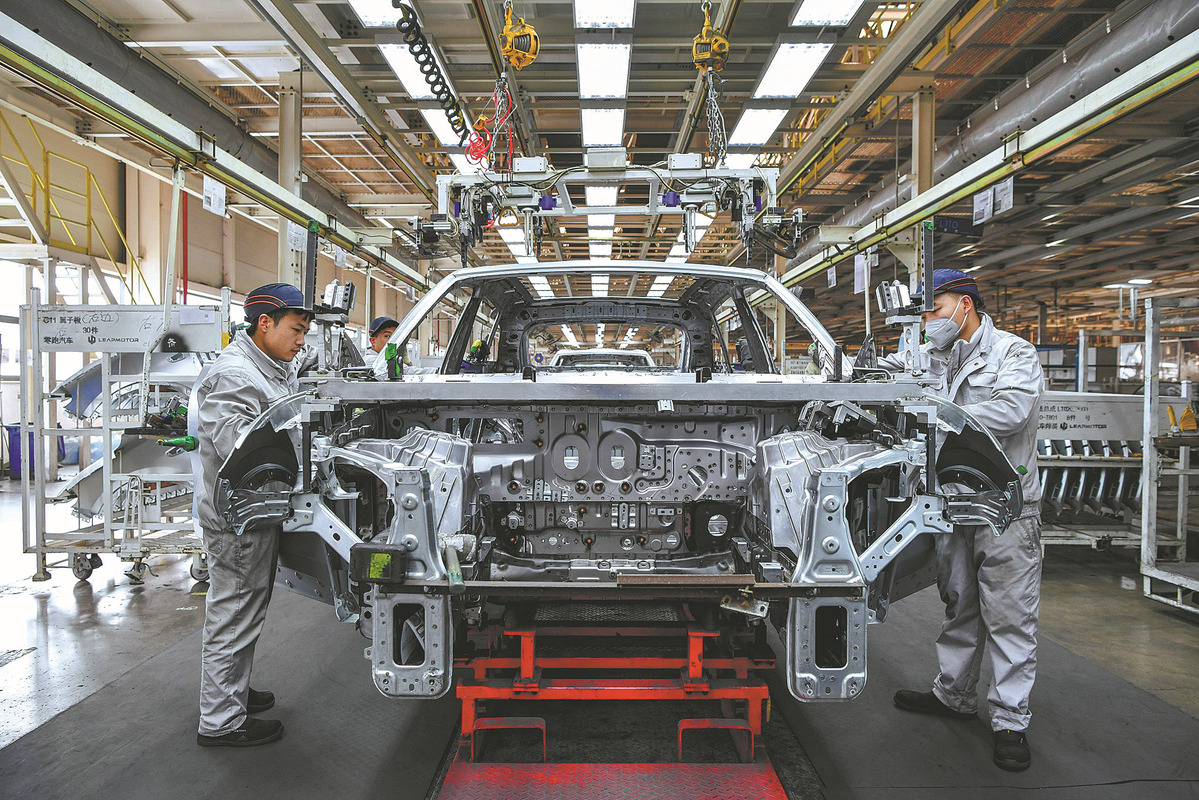International brands losing influence as market grows
Global manufacturers plan comeback over the next few years


China's vehicle market, the world's largest, grew even bigger in 2024, with 25.57 million units delivered, up 1.6 percent year-on-year, according to the China Association of Automobile Manufacturers.
Combined with exports, the figure rose to 31.43 million units, up 4.5 percent from 2023, said the CAAM.
But the growing pie had little to do with international carmakers: almost all of them, with the rare exceptions of Tesla and Toyota's premium arm Lexus, saw sales slip or even slide in the country.
In the passenger vehicle segment, foreign brands' combined market share stood at 34.8 percent, down from 60.8 percent in 2019, according to statistics from the CAAM.
Mercedes-Benz Cars sold 683,600 vehicles in China in 2024, down 7 percent from 2023.
Toyota, the world's largest carmaker by sales, saw a similar drop in the country, with its sales falling to 1.78 million units.
Volkswagen Group delivered 2.93 million vehicles in China, down 9.5 percent from 2023.
Analysts said that was primarily due to the rise of new energy models from Chinese marques, which are launching vehicles loaded with smart features at a speed much faster than those international giants.
Young, tech-savvy Chinese consumers, ready to try new cars from domestic brands, are convinced that such brands like BYD or Chery are doing a better job than Ford or Volkswagen in the NEV segment.
BYD sold 4.25 million vehicles in 2024, up 41.1 percent year-on-year, of which 58.5 percent were plug-in hybrids.
Premium car buyers are shifting from traditional marques such as Mercedes-Benz and Volvo to local startups including Nio and Zeekr.
Volvo sold 156,000 vehicles in China, down 8 percent year-on-year, although its global deliveries went up 8 percent to 763,400 units.
Zeekr, a marque of Chinese car conglomerate Geely which owns Volvo, saw its sales soar 87 percent year-on-year to 222,123 units.
Yet some major global carmakers are ramping up their efforts to catch up, with a slew of new models which are said to be tailored for the Chinese market in the pipeline.
Analysts said the year 2024 could be the lowest point for them, and their market share is expected to rebound from 2025 with the unveiling of those models.
Ralf Brandstaetter, chairman and CEO of Volkswagen Group China, is confident about the German car group's future in the country.
"If I had to describe 2024 in one word, it would be transformation. We made significant strides in bringing our strategy to life, demonstrating our long-term commitment to China," he said.
New electric models from Volkswagen's Audi brand are expected to hit the market this year, some of which feature smart solutions from Chinese giant Huawei.
Also this year, Volkswagen will debut the first model based on the China Main Platform, tailored for the Chinese market.
It will also showcase a range-extended vehicle this year, which will be the first from Volkswagen Group, slated for launch in 2026.
"The year 2025 will be full of challenges as well, but from 2026 we will advance in the market in a more competitive way," said Brandstaetter.
He expects the Chinese market to grow to 28 million units by 2030, of which Volkswagen will have a 15 percent share, or around 3.5 million vehicles, up from 11 percent in 2024.
BMW Group is set to expand its offerings in 2025 as well, with more than 10 new BMW models and several new MINI and BMW motorbikes slated for launch.
A highlight of 2025 for the German carmaker will be the global debut of its highly anticipated Neue Klasse models. They will be produced in China from 2026.
BMW said these vehicles, showcasing BMW's cutting-edge innovations, will set new benchmarks for the brand's future lineup.
Among other things, they will feature the Panoramic iDrive, which made its global premiere earlier in January at the 2025 CES in Las Vegas.
The iDrive is powered by the self-developed BMW Operating System X, with 70 percent of the source code developed and optimized in China based on local user preferences.
Also, the Neue Klasse models will feature BMW's latest generation of advanced driver assistance systems, with much involvement from BMW China's R&D team.
BMW is the most successful premium carmaker in China's electric vehicle segment.
Its BMW and MINI brands saw a 7.7 percent year-on-year growth in pure electric vehicle sales in China, accounting for 15 percent of their total deliveries in the country in 2024.
Cumulatively, BMW Group has delivered more than 400,000 new energy vehicles in the Chinese market.
Japanese carmaker Nissan is introducing NEV models into the Chinese market as well, with the number to reach eight by 2026.
SAIC GM, a joint venture between Chinese carmaker SAIC and GM, has said that it will launch 12 NEV models from 2025 to 2027. All of them are to be defined and developed by R&D staff in China to cater to local car buyers' demand.
The joint venture delivered 435,000 vehicles in 2024 in China, down 56.5 percent from 2023.




































